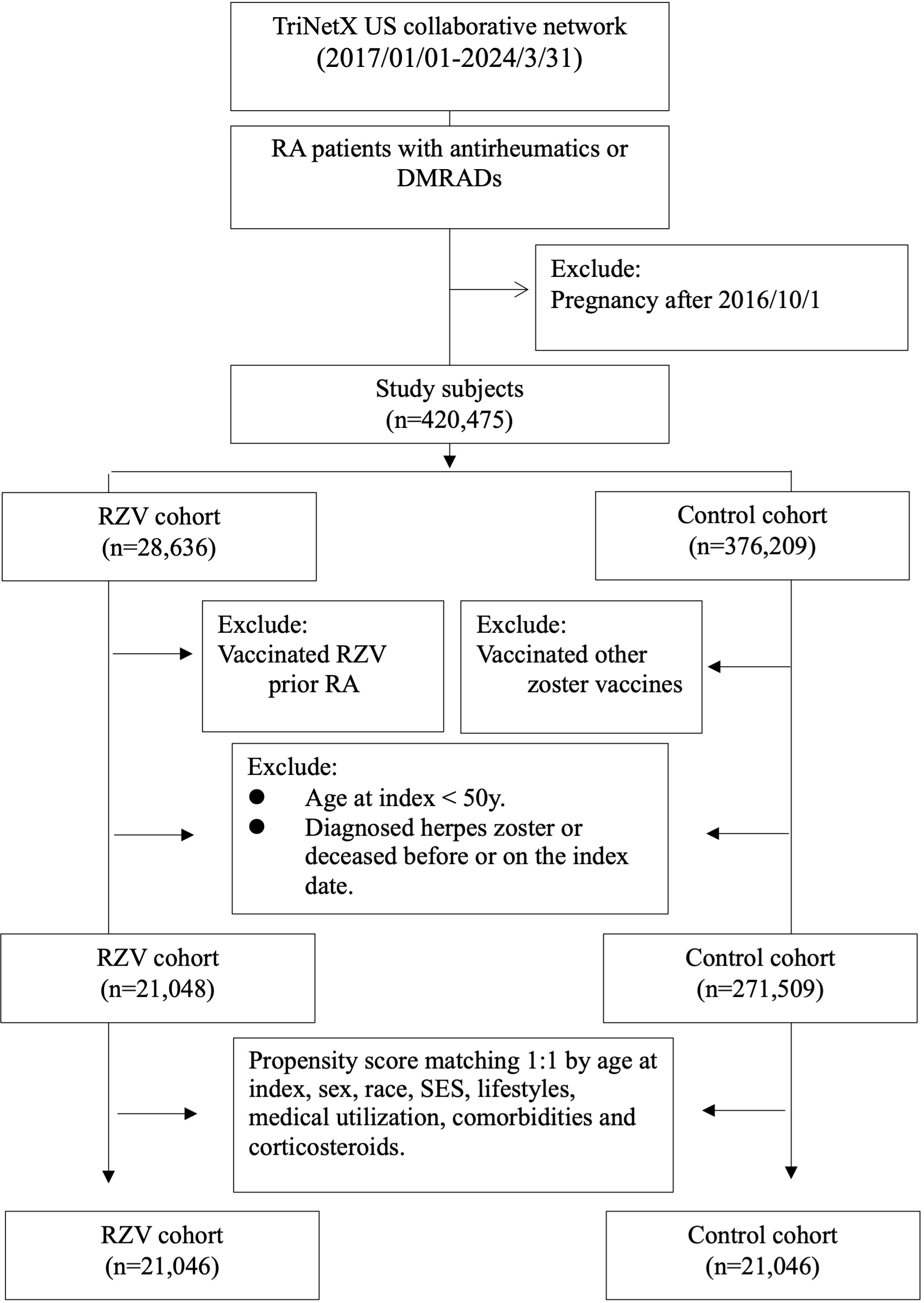Session Information
Session Type: Poster Session B
Session Time: 10:30AM-12:30PM
Background/Purpose: Patients with rheumatoid arthritis (RA) are at increased risk of developing herpes zoster (HZ). This study aimed to assess the effectiveness of recombinant zoster vaccine (RZV) in reducing both the incidence of HZ and all-cause mortality among individuals with RA.
Methods: We conducted a retrospective cohort study using data from the TriNetX U.S. Collaborative Network between October 1, 2017, and March 31, 2024. The study population consisted of RA patients who received RZV (RA-RZV cohort) and those who did not (RA control cohort). Propensity score matching (PSM) was employed to balance baseline characteristics between the groups, accounting for demographics, social economic status, lifestyles, medical utilization, comorbidities, and medications. The primary outcomes were the risk of HZ and all-cause mortality. PSM-adjusted hazard ratios (HRs) were calculated using Cox proportional hazards regression models. Kaplan-Meier curves and Log-Rank tests were used to evaluate survival differences.
Results: After PSM, each cohort included 21,046 individuals. The RA-RZV group demonstrated significantly lower risks of HZ (HR: 0.836, 95% CI: 0.738–0.947) and all-cause mortality (HR: 0.606, 95% CI: 0.561–0.654). The HZ risk reduction was more pronounced in patients aged 50-64 years (HR: 0.731, 95% CI: 0.610–0.876), females (HR: 0.791, 95% CI: 0.684–0.915), White (HR: 0.808, 95% CI: 0.696–0.937), and Black/African American participants (HR = 0.685; 95% CI = 0.481–0.976).
Conclusion: RZV vaccination is associated with a reduced risk of HZ and mortality among RA patients aged 50 years and older. RZV vaccination should be prioritized among eligible RA patients.
 Kaplan-Meier curve of herpes zoster infection
Kaplan-Meier curve of herpes zoster infection
.jpg) Kaplan-Meier curve of all-cause mortality
Kaplan-Meier curve of all-cause mortality
.jpg) Study flow of patients selection
Study flow of patients selection
To cite this abstract in AMA style:
Wei J, Wang S, Lin Y. Effectiveness of Recombinant Zoster Vaccine in Reducing Herpes Zoster Incidence and All-Cause Mortality Among Rheumatoid Arthritis Patients: A Retrospective Cohort Study of 21,046 Individuals from TriNetX U.S. Collaborative Network [abstract]. Arthritis Rheumatol. 2025; 77 (suppl 9). https://acrabstracts.org/abstract/effectiveness-of-recombinant-zoster-vaccine-in-reducing-herpes-zoster-incidence-and-all-cause-mortality-among-rheumatoid-arthritis-patients-a-retrospective-cohort-study-of-21046-individuals-from-tri/. Accessed .« Back to ACR Convergence 2025
ACR Meeting Abstracts - https://acrabstracts.org/abstract/effectiveness-of-recombinant-zoster-vaccine-in-reducing-herpes-zoster-incidence-and-all-cause-mortality-among-rheumatoid-arthritis-patients-a-retrospective-cohort-study-of-21046-individuals-from-tri/
